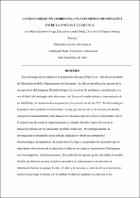Please use this identifier to cite or link to this item:
https://repositorio.uco.edu.co/jspui/handle/20.500.13064/1120Full metadata record
| DC Field | Value | Language |
|---|---|---|
| dc.rights.license | http://creativecommons.org/licenses/by/3.0/ | - |
| dc.contributor.author | Quintero-Ortega, Ana María | spa |
| dc.contributor.author | Hernández-Mejía, Dinora | spa |
| dc.contributor.author | Vásquez-Bedoya, Dora Astrid | spa |
| dc.coverage.spatial | Sudamérica, Colombia, Medellín, Antioquia | spa |
| dc.date | 2021-06-11 | - |
| dc.date.accessioned | 2022-02-14T21:49:26Z | |
| dc.date.available | 2022-02-14 | |
| dc.date.available | 2022-02-14T21:49:26Z | |
| dc.date.issued | 2021-06-11 | - |
| dc.identifier.uri | https://repositorio.uco.edu.co/handle/20.500.13064/1120 | - |
| dc.description.abstract | Esta investigación se realizó en la Institución Educativa Playa Rica - ubicada al occidente del Municipio de Bello, Departamento de Antioquia-. En ella se identifican los aportes de la incorporación del programa Flexischooling en los procesos de enseñanza y aprendizaje, a su vez el diseño de estrategias educativas que contribuyan al fortalecimiento y mejoramiento de las habilidades, el desarrollo de competencias y la apropiación de las TICS. Flexischooling es el producto del cuerdo de escolarización a tiempo parcial por el cual la escuela y la familia comparten responsabilidades educativas. Con esta investigación se buscó comprender cuál es el impacto que ha tenido la implementación del modelo flexible a partir del uso de la educación bimodal en los estudiantes de dicha institución. Metodológicamente, la investigación se desarrolló con un método cualitativo y desde una perspectiva fenomenológica hermenéutica. Se aspiró con ello llegar a comprender las relaciones que se tejen dentro del contexto de la educación flexible en un contexto determinado. Participaron en la investigación, fundamentalmente, 26 estudiantes de séptimo grado vinculados al modelo flexible por diversas razones de índole personal. Los instrumentos de recolección de información fueron los grupos focales, el taller y la encuesta, a partir de allí se construyeron matrices para luego continuar con el análisis de datos recopilados en cada una de las actividades realizadas con los estudiantes, padres de familia y docentes de la Institución Educativa Playa Rica, los cuales arrojaron los resultados de la investigación. | spa |
| dc.format.extent | 32 | es_ES |
| dc.format.mimetype | application/pdf | spa |
| dc.language.iso | spa | es_ES |
| dc.rights | info:eu-repo/semantics/openAccess | spa |
| dc.rights.uri | http://creativecommons.org/licenses/by-nc-sa/2.5/co/ | spa |
| dc.subject | Flexischooling | es_ES |
| dc.subject | Modelo de educación flexible | es_ES |
| dc.subject | Bimodalidad educativa | es_ES |
| dc.title | La escolarización combinada, una experiencia significativa entre la familia y la escuela | es_ES |
| dc.type | Master thesis | spa |
| dc.description.abstractenglish | This research was carried out at the Playa Rica Educational Institution - located west of the Municipality of Bello, Department of Antioquia-. It identifies the contributions of the incorporation of the Flexischooling program in the teaching and learning processes, and, in turn, the design of educational strategies that contribute to the strengthening and improvement of skills, the development of competencies and the appropriation of skills. ICT. Flexischooling is the product of that part-time schooling agreement whereby the school and the family share educational responsibilities. This research seeks to understand what is the impact that the implementation of the flexible model has had from the use of bimodal education in the students of said institution. Methodologically, the research was developed under a qualitative paradigm and from a hermeneutical phenomenological perspective. With this we aspired to understand the relationships that are woven within the context of flexible education in each context. Participate in the research, mainly, 26 seventh grade students linked to the flexible model for various reasons of a personal nature. The information collection instruments were the focus groups, the workshop, and the survey, from there we constructed matrices and then continued with the analysis of data collected in each of the activities carried out with the students, parents and teachers of the Playa Rica Educational Institution which gave us the results of the investigation. | eng |
| dc.subject.subjectenglish | Flexischooling | es_ES |
| dc.subject.subjectenglish | Flexible education model | es_ES |
| dc.subject.subjectenglish | Educational bimodality | es_ES |
| dc.subject.lemb | Agrupamiento flexible(Educación) | es_ES |
| dc.subject.lemb | Agrupamiento flexible de estudiantes | es_ES |
| dc.subject.lemb | Reforma educativa | es_ES |
| dc.subject.lemb | Modernización educativa | es_ES |
| dc.subject.lemb | Pedagogía experimental | es_ES |
| dc.type.hasversion | info:eu-repo/semantics/acceptedVersion | spa |
| dc.rights.accessrights | Open Access | spa |
| dc.rights.spa | Acceso abierto | es_ES |
| dc.rights.cc | Atribución-NoComercial-CompartirIgual 2.5 Colombia | spa |
| dc.publisher.department | Ciencias de la educación | es_ES |
| dc.publisher.program | Maestría en educación virtual | es_ES |
| dc.description.city | Medellín | spa |
| dc.contributor.corpauthor | Universidad Católica de Oriente. Facultad de Ciencias de la Educación.Maestría en Educación, modalidad virtual | spa |
| dc.identifier.bibliographicCitation | Quintero Ortega, Ana María; Hernández Mejía, Dinora; Vásquez Bedoya, Dora Astrid. La escolarización combinada, una experiencia significativa entre la familia y la escuela (Tesis) Medellín, Antioquia: Universidad Católica de Oriente; 2021. 32p. | es_ES |
| dc.type.driver | info:eu-repo/semantics/masterThesis | spa |
| dc.type.coar | http://purl.org/coar/resource_type/c_bdcc | spa |
| dc.type.redcol | https://purl.org/redcol/resource_type/TM | spa |
| dc.type.local | Tesis/Trabajo de grado - Monografía - Maestría | spa |
| Appears in Collections: | Maestría en Educación virtual | |
Files in This Item:
| File | Description | Size | Format | |
|---|---|---|---|---|
| La escolarización combinada, una experiencia significativa entre la familia y la escuela..pdf | 388.42 kB | Adobe PDF |  View/Open | |
| Autorización de depósito Ana María Hernandez.pdf Until 2050-12-31 | 897.72 kB | Adobe PDF | View/Open Request a copy |
This item is licensed under a Creative Commons License

